- Home
- Cheryl Bolen
Miss Hastings' Excellent London Adventure (Brazen Brides Book 4) Page 2
Miss Hastings' Excellent London Adventure (Brazen Brides Book 4) Read online
Page 2
She shrugged. "I have very little money and very little idea of how much a hackney driver would demand for his services."
He stopped and whirled to her, his brows lowered. "This your first-ever time in London? Your first day . . . er, I mean night?"
"Yes."
"Do you not realize how dangerous it is for a young lady to walk about alone at night?"
"Oh yes. My Aunt Harriett has warned me about the madmen in London who prey on women. Since I left the coaching inn. I've raced along as quickly as I could. And I prayed the whole time that the Almighty would keep me safe."
He cast a glance at her. How truly virtuous she must be. "And stupid."
"Pardon? Are you saying I'm stupid?"
He'd thought it, but he hadn't meant to say it. "Forgive me. I'm sure you are not stupid, but it is highly unlikely the Almighty will descend into this metropolis to protect a young lady from Upper Barrister."
Her manner stiffened. "Barrington," she corrected. "Upper Barrington, and you, sir, must be a heathen."
He nodded. "Your Aunt Henrietta would be most appalled over my heathen ways."
"Harriett," she corrected.
He screwed up his (admittedly handsome) face and regarded her thoroughly. "Are you, by chance, a governess?"
"No. I am soon to be learning how to preside over the Ceylon Tea Company, which my uncle owns."
"I say, the fellow who lives next door to me is one of the owners the Ceylon Tea Company."
"Then you, sir, must live next door to my uncle, who resides at 302 Curzon Street."
"Daresay you're right."
They walked along in silence for a good while when he saw the huge lanterns that illuminated Nick's house. He mumbled a curse. "We've gone too bloody far." The fog and the distraction of the girl—not to mention his brandy-impaired state—had caused him to miss turning onto Halfmoon Street.
Ignoring him, she strode to the iron gates and seemed mesmerized by his brother's house. In addition to the abundant lanterns, the courtyard was lighted from rows of huge Palladian windows glowing from abundant candlelight. "I've never seen anything so magnificent! Is this where the Prince Regent lives?"
"No." Though it was said to be the finest house in London. "Me brother lives in that pile of opulentaciousness."
She whirled to him, eyes rounded. "Are you jesting?"
"About the house or my brother?"
"Both."
"Neither. Would you like to see the house?"
"Oh, I couldn't. Not the way I look at present." She continued to eye him suspiciously. Did she think he was lying about it being his brother's house? Finally, she spoke. "Opulentaciousness is not a word. I declare, sir, have you been imbibing strong spirits?"
"I can undersplain. I'm attempting to drown a broken heart."
Her head cocked, she looked up at him and asked, "Did you succeed?"
He shook his head ruefully. "Still remember the vixen's name."
"I see. You meant to drink until you could no longer recall her name?"
"'Twas my intent."
"And what is the vixen's name?"
"Maria."
After a moment of contemplation, she said, "So, do we turn back?"
"Indeed we do."
"So . . . that brother who owns that magnificent house . . . I suppose he's the firstborn."
"He is."
She sighed. "I suppose you wish you were the firstborn to have all the advantages that go with it."
No sense explaining that since they were not nobility, their father had divided his estate equally among his three sons while providing a hefty dowry for his daughter as well as an exceedingly comfortable income for his widow. "The only time I wished to be the eldest was when Nick was bigger than me so I could best him in one of our frequent fights."
"Do you get along now?"
"Brilliantly." Except tonight.
They walked in silence for several minutes. She likely believed him a drunkard atheist.
When they reached Curzon Street, she seemed impressed. "These houses are very grand."
"Daresay they're taller than what you see in Upper Barriston."
"Barrington."
He came to stop in front of her uncle's house. It was completely dark, even though the hour was not that late. The houses surrounding it had many lighted windows. "This is your uncle's house. Never been inside of it myself."
Her brows squeezed together. "Does it not seem odd to you that it's the only house without candles? Is this my uncle's custom?"
"No. He's not known to be parsimonious."
"What can have happened to make Uncle fail to meet my coach? To have even stolen away his servants?"
"I'm sure there must be servants—even if your uncle has forgotten you." Not the best choice of words. "Er . . . I didn't precisely mean your uncle has forgotten you."
"I shall find out." She mounted the two steps to the shiny black door and rapped at its equally shiny brass knocker.
A minute passed. She rapped again. Another minute ticked by as she waited.
He let go of the portmanteau's strap. "Here, let me try." He came to stand beside her and rapped at the brass knocker, then pounded upon the thick wooden door with all his strength. His efforts were no more successful then hers.
"Oh, dear, what shall I do?" she asked, her voice more forlorn than it had been in the previous half hour of their acquaintance.0
He froze. A snatch of lucidity sharpened his stupored mind like a magnifying glass to a blurred word. He suddenly remembered why the house was dark, why no uncle had met her coach, why the name Simon Hastings was familiar to him.
The man had died three or four days earlier. Adam's valet had told him all the servants had been forced to find new positions.
But Adam could hardly break such sorrowful news to the girl now. Not after the ordeal she'd endured the past few hours. How terrified she must have been when no one greeted her. Even more horrifying was the prospect of dragging her possessions across the vast and strange city. At night. In near-freezing rain.
He turned to her and smiled. "Not to worry. We'll put you up at my house tonight."
Chapter 2
This gentleman's house might not be as opulentacious as his brother's, but it was the grandest house Emma had ever seen. In size, it was no larger than Aunt Harriett's, but where Auntie's house was furnished in dark, ancient Tudor pieces with faded upholstery, every elegant piece of this heavily gilded decor gave a nod to the French. Her eye was drawn to a massive crystal chandelier lighting the entry hall's marble staircase.
A second son he might be, but this man must be exceedingly wealthy—sot or not. She suddenly became shy in his presence.
After greeting his master, the butler quietly locked the massive entry door behind them and took up the long-handled snuffer, no doubt to darken the house now that its owner had returned.
"Tell me, Studewood," the gentleman asked the butler, "which room would be best to put this lady in?"
Studewood's manner did not change one bit as he calmly said, "The yellow room, I should say, Mr. Birmingham. Since the other servants are in their beds, I'll just pop up and see that there's a fire in the young lady's chamber." The butler put down the long-handled snuffer, took the strap to her portmanteau, and started up the stairs.
At last, she now knew this man's name. Mr. Birmingham. It seemed a solid name. If he weren't such a reprobate, he'd be . . . awfully appealing. No man in Upper Barrington could match this dark-haired man for handsomeness. Indeed, no man in Upper Barrington dressed so fine, either—not even their revered kinsman, Sir Arthur Lippincott—who actually lived in Lower Barrington. What tailor would not adore clothing a man with such long limbs and trim waist and broad shoulders as Mr. Birmingham? He would show to great advantage any clothing he wore.
"Allow me to escort you to your chambers," Mr. Birmingham said to her.
Their eyes briefly locked. His were dark and piercing. She nodded, then lowered her lashes and began to mount
the staircase.
When they were half way up, he paused on a step and swayed as he glanced back at her. "I shappose I should know your name."
Afraid he'd tumble down the stairs, she came to his side. "I'm Miss Emma Hastings. Do give me your arm to hold onto, Mr. Birmingham." She could hardly tell him it was he who needed to hold onto her.
"I say, how did you know my name?" He proffered his arm.
"Your butler addressed you."
"Show he did."
They came to the first floor where the entertaining rooms were located and continued to mount the stairs to the next level. Before they rose to the next floor, she tried to take in as much as she could of the tasteful drawing room with its richly patterned carpets, silken draperies, and slender-legged furniture. She was struck that, unlike at Sir Arthur's, the walls of Mr. Birmingham's stairwell were devoid of ancestral portraits. That must mean the Birmingham wealth was new.
One part of her was pleased to be able to stay in this lovely home, even if only for one night, especially since there was no alternative. She knew not a soul in this mammoth city. But another part of her—the part under the influence of Aunt Harriett—kept warning her how dangerous it was to be staying with a strange man. What would she do if he tried to take liberties with her? He was so tall, and she was so small.
Her closest friend back in Upper Barrington, Anne Forester had shared with Emma her six elder brothers' advice on how to thwart unwanted advances. They instructed Anne to kick or to knee the offending man in that unmentionable part of his anatomy. Emma decided she would not hesitate to do that to Mr. Birmingham if he should press those kinds of attentions upon her.
"Let me see," Mr. Birmingham said when they reached the upper floor, "which of these blasted chambers is the yellow?" He stopped and looked down at her. She was still linking her arm to his yet attempting not to show how stunned she was that Mr. Birmingham was not familiar with every room in his own house.
"Studewood did say the yellow room, did he not?" he asked.
She nodded.
His eyes squinted at the door to the second room. "This may be it." He opened the door to a rose-coloured bedchamber, then shook his head. "Not yellow. Perhaps it's across the corridor." On wobbly legs, he crossed the hallway and opened the door opposite the red chamber. "Ah! Here it 'tis."
Not without trepidation, she swept past him and entered the chamber. She was nearly overwhelmed by its beauty. The bed was swathed in pale yellow silk. A brocade of the same shade covered the walls, and more of the fine yellow silk hung at the chamber's two tall casements. The fireplace, where Studewood was succeeding at starting a fire, was surrounded by a creamy marble chimneypiece adorned with a turquoise porcelain clock. Near the fireplace reposed an elegant chaise of apple green silk, and beside it, her portmanteau. What a home this was! How fortunate was Mr. Birmingham.
Studewood's presence lessened her alarm. Surely, no man would compromise a young woman’s virtue in front of his servant. Then she recalled how placidly Studewood had accepted the news that she would be a guest tonight. Was bringing home strange women a customary occurrence for his master? Her heartbeat accelerated as she stealthily glanced at Mr. Birmingham whilst appearing to examine the writing desk, a small gilt table in the French style. He seemed completely disinterested in her.
Thank goodness!
As the coals began to burn, Studewood got to his feet and addressed her. "This should keep you warm all night, miss." With a nod, he left the chamber.
She was about to order her host to leave her sleeping chamber when a curious thing happened. He yawned deeply, eyed her chaise, and collapsed upon it.
For a frightful moment, she thought he had died. Her heartbeat hammering, she raced to the chaise and bent over Mr. Birmingham.
And he started to snore!
She recalled that bosky Jeb Hickman of Upper Barrington had a propensity—after over indulging in spirits, which he most lamentably did with frequency—to fall into exceedingly deep slumber in the most unexpected places. Once in Squire Peterfund's trough, another time in the back of the Widow Pennington's pony cart, and more than once in a pew at St. Stephen's!
What was she to do? She cupped a hand to Mr. Birmingham's arm and shook him. He snored some more. The next time she shook him harder. He snored louder. Oh, dear. It was not likely she would be able to rouse him.
She could hardly sleep in the same chamber with a man. Perhaps she could cross the corridor and sleep in the rose chamber. As disappointed as she was to leave this room—especially now that the fire was warming it—she went to the rose room. Though it was even lovelier than the yellow chamber, it felt as if she were standing on a frozen moor. A servant must have left the window open. She strolled across the room and closed the casement. Hugging her own arms, she left the room, knowing she could not sleep there.
From the moment she'd seen her portmanteau in the yellow room, it had seemed like she was meant to be there. The way it claimed her was almost like some kind of Divine proclamation.
Who was there to find out she had (quite innocently) shared a bedchamber with a man? Just so long as Aunt Harriett did not discover the truth. Standing there in front of the fire, Mr. Birmingham snoring in the background, she could almost hear Auntie say, "Once lost, a lady's good reputation can never be regained."
In this, Auntie was likely right. What manner of man would offer marriage to a sullied lady? Emma did not want to impede her chances of being some man's wife. She did so long to be married. Before Uncle had invited her to London, Aunt had encouraged Emma to wed. It had been most unselfish of her, too, because Emma knew Aunt Harriett didn’t want her to leave.
But Auntie was pragmatic enough to know she was nearing the end of her life. “When I’m gone,” her aunt would say, “all that I have will revert back to the estate of my father’s lawful heir. You will be alone. And penniless.”
For those reasons, Aunt had been pleased when Emma was given the opportunity to make her home in London.
Dare she trust that Mr. Birmingham was truly a gentleman? Could she trust him not to tell anyone he had shared a bedchamber with Miss Emma Hastings? Her gaze fanned to the beautiful bed. How she longed to climb upon it and rest her weary limbs. She was so exhausted, she understood how Mr. Birmingham could have collapsed upon the chaise. She could easily sink down on the mattress and fall into a deep sleep.
Given her lack of alternatives, that is what she would do.
But she could not undress in front of Mr. Birmingham, even if his awakening was about as likely as Uncle Simon knocking upon her chamber door. She tiptoed to her portmanteau and quietly opened it to retrieve her sleeping gown. Then she tiptoed to the bed and climbed upon it. She drew the fully lined bed curtains all the way around the bed for privacy and stripped off the damp traveling clothes she had worn for two days. After slipping into her linen night shift, she buried herself beneath the covers and promptly feel asleep.
* * *
He wasn't at all sure he could lift his head. It felt as if it had been bashed with a cricket bat. Repeatedly. He opened one eye. Then the other. He had fully expected to see the familiar blue bed coverings in his bedchamber, but he did not. Good lord, was he once again waking up in a strange bedchamber? A light rose scent tempered his disorientation. Now that he thought about it, though, he realized he was not actually on a bed. His gaze moved. The first item he spotted was a turquoise clock. He'd bought the blasted thing himself. Did that mean . . . he was at his own house?
He bolted up.
And locked gazes with a young woman who smelled of roses. She was not much more than a foot away from him. She sat in a chair facing the chaise longue he'd slept on. He was about to press some coins into her hands and send her on her way when he thought better of it.
He took a long look at her. The last time he'd seen her, he now remembered, her hair had been wet. Now that it was dry he could tell it was a warm brown, the color of tree bark. Quite an ordinary color. In fact, everything about the you
ng lady was ordinary. She was not a great beauty as Maria had been. Yet all of her features were pleasing. And so was her sweet rose scent.
As for her age, he would put it somewhere between eighteen and twenty, though she was not much larger than a twelve-year-old girl.
She smiled at him. Her teeth were even and white, and when she smiled, she was pretty—in a quiet way.
Before he could respond, he remembered something else about her. She was not a doxy. Even though everything about him was impaired, he knew he had not taken advantage of this girl.
Which made his presence in her bedchamber all the more offensive. What vile depths had he sunk to? How repulsed she must be over his drunken behavior. How embarrassing that this maiden had likely been exposed to the obnoxious roar of his snores!
He stood and bowed. "Allow me to apologize for my unforgiveable behavior."
She regarded him stiffly, in much the same manner his mother had when he'd been a naughty lad. "It's your home, Mr. Birmingham. Even if you are a Godless hedonist, I am grateful that I had a warm bed in which to sleep, and I shall be even more grateful if you never, ever reveal that you and I shared a bedchamber."
"'Pon my word, I am a gentleman, even if that presently seems inconceivable to you. I'm not always in my cups. I had a very good reason for my intoxication."
"Maria," she said with a nod.
He grimaced. "I told you that?"
She nodded ruefully, then quickly changed the topic. "It was actually awfully kind of you to allow me to stay here. I will own, I was blindsided that no one was at my uncle's house." She stood. "Surely he'll be there this morning. It's no longer raining. I'll just get along. One of Uncle Simon's servants can collect my portmanteau later." She walked toward the chamber door, then turned back. "I beg that you deceive your servants into thinking you slept in your own chamber last night."
At the surfacing memory of who her uncle was, he thwacked his forehead. He needed to tell her the truth. But he'd rather eat his boot than do that. "Don't go."
She raised a fine brown brow and stared at him with her hazel eyes. Perhaps they were a smidgeon above ordinary.

 With His Lady's Assistance (The Regent Mysteries Book 1)
With His Lady's Assistance (The Regent Mysteries Book 1)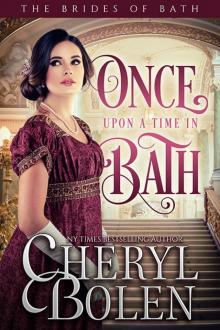 Once Upon a Time in Bath
Once Upon a Time in Bath One Room at the Inn (The Lords of Eton Book 4)
One Room at the Inn (The Lords of Eton Book 4) His Lady Deceived
His Lady Deceived Last Duke Standing
Last Duke Standing Counterfeit Countess: Brazen Brides, Book 1
Counterfeit Countess: Brazen Brides, Book 1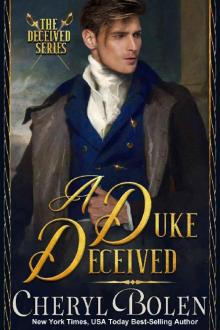 A Duke Deceived (The Deceived Series Book 1)
A Duke Deceived (The Deceived Series Book 1) An Egyptian Affair (The Regent Mysteries Book 4)
An Egyptian Affair (The Regent Mysteries Book 4) Winter Wishes: A Regency Christmas Anthology
Winter Wishes: A Regency Christmas Anthology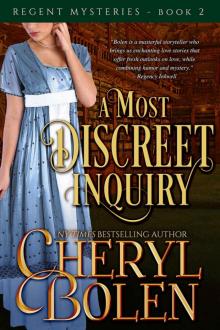 A Most Discreet Inquiry (The Regent Mysteries Book 2)
A Most Discreet Inquiry (The Regent Mysteries Book 2) The Portrait of Lady Wycliff
The Portrait of Lady Wycliff A Lady by Chance (Historical Regency Romance)
A Lady by Chance (Historical Regency Romance) His Lordship's Vow (Regency Romance Short Novel)
His Lordship's Vow (Regency Romance Short Novel) Lady Sophia's Rescue (Traditional Regency Romance)
Lady Sophia's Rescue (Traditional Regency Romance) A Birmingham Family Christmas
A Birmingham Family Christmas Oh What A (Wedding) Night (Brazen Brides #3)
Oh What A (Wedding) Night (Brazen Brides #3) A Christmas In Bath
A Christmas In Bath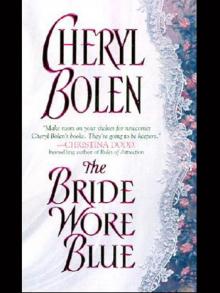 THE BRIDE WORE BLUE
THE BRIDE WORE BLUE Miss Hastings' Excellent London Adventure (Brazen Brides Book 4)
Miss Hastings' Excellent London Adventure (Brazen Brides Book 4) Marriage of Inconvenience
Marriage of Inconvenience Ex-Spinster by Christmas: House of Haverstock, Book 4
Ex-Spinster by Christmas: House of Haverstock, Book 4 With His Ring (Brides of Bath Book 2)
With His Ring (Brides of Bath Book 2) The Theft Before Christmas (The Regent Mysteries)
The Theft Before Christmas (The Regent Mysteries) The Theft Before Christmas
The Theft Before Christmas To Take This Lord (The Brides of Bath Book 4)
To Take This Lord (The Brides of Bath Book 4)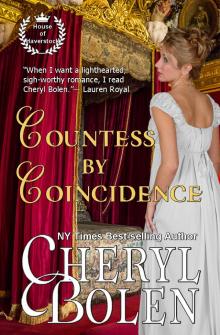 Countess by Coincidence
Countess by Coincidence Captivated by His Kiss: A Limited Edition Boxed Set of Seven Regency Romances
Captivated by His Kiss: A Limited Edition Boxed Set of Seven Regency Romances A Birmingham Family Christmas (Brazen Brides Book 5)
A Birmingham Family Christmas (Brazen Brides Book 5) My Lord Wicked (Historical Regency Romance)
My Lord Wicked (Historical Regency Romance) A Duke Deceived
A Duke Deceived The Earl, the Vow, and the Plain Jane
The Earl, the Vow, and the Plain Jane The Bride's Secret
The Bride's Secret The Earl's Bargain (Historical Regency Romance)
The Earl's Bargain (Historical Regency Romance) Rebels, Rakes & Rogues
Rebels, Rakes & Rogues One Golden Ring
One Golden Ring